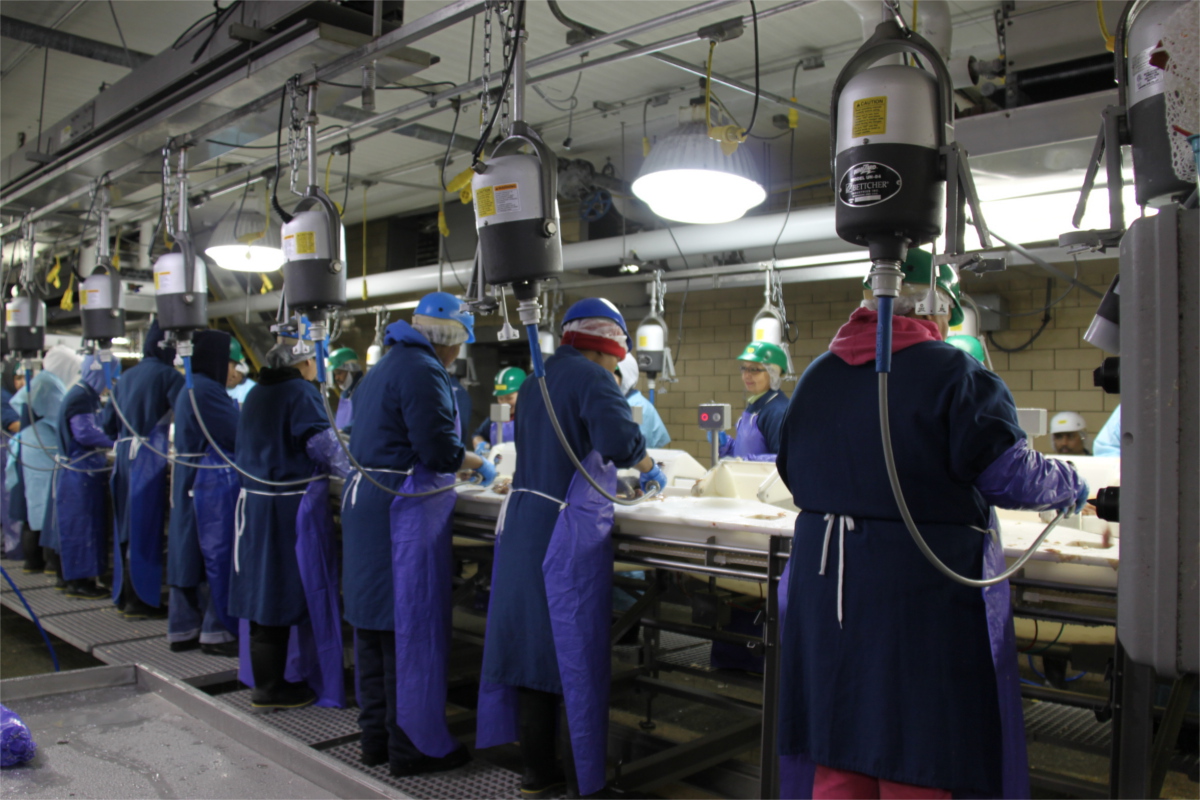
High-production chicken plants that process up to 45 birds per minute offer some of the most dangerous jobs in the country and show a history of recruiting a workforce vulnerable to exploitation. (Senator Chris Coons/flickr)
On August 7, hundreds of immigration officials raided seven processing plants in Mississippi, arresting at least 680 workers suspected of working illegally. It was one of the largest single crackdowns of its kind in US history.
The facilities face possible charges of "willfully and unlawfully" employing undocumented workers.
The plants are owned by several heavy-hitting companies, including Peco Foods, Koch Foods, Pearl River Foods and A&B Inc.
So far, the consequences of this raid have landed squarely on the workers and surrounding community. About 300 were arrested and released on the same day, and the remainder held at an ICE facility in Louisiana.
Local communities describe ripple effects, with a severe drop in business that depends on the plants, like grocery stores and bakeries. It also affects businesses that employed detained plant workers in secondary jobs.
The impact on the companies operating the plants has been minimal. No charges have been filed against them, though an investigation is ongoing.
Koch foods held a job fair this week where more than 200 workers lined up to replace those lost in the raid.
A Washington Post piece described many applicants looking for an income boost from minimum wage jobs paying $7.25 an hour to jobs at the plant offering up to $12.
Some faced a common dilemma for minimum-wage workers, who earn just enough to be disqualified from food stamps, but not enough to live on.
It may take some time to fill openings left in the wake of raids, but history shows that the plants will chug on without significant losses or legal penalties.
Ted Genoways, author of a book about the food processing industry titled The Chain, told NPR that similar raids were held at plants in Postville, Iowa, in 2008 and at Swift & Co. plants in 2006. He said those who hired undocumented works saw very little fallout.
Koch Foods settled with the Equal Employment Opportunity Commission last year for $4 million amid accusations of racial and sexual harassment against Latina workers.
Repetition, a blistering production pace, and razor sharp blades make poultry processing at high-volume plants one of the most dangerous jobs in the country.
Many production line workers face carpal tunnel injuries from performing the same motion up to 15,000 times a day.
An investigation by ProPublica in 2017 found that since 2010, more than 750 processing workers suffered amputations.
Many have described abhorrent and unlawful conditions, some forced to wear diapers on the plant floor during shifts because they are not allowed bathroom breaks.
A 2015 report from Oxfam America outlines a decades-long strategy from the meat processing industry to target vulnerable workers least likely to file complaints or take legal action about conditions.
Anthropologist Angela Stuesse of the University of North Carolina wrote that during the Civil Rights era, the number of African-Americans working in the industry began to grow.
But during the 1970s and 1980s, those workers began to organize and to fight for their rights, and the industry started to look for new workers.
Industry executives she interviewed decided to encourage the recruitment of Latino immigrants, labeling the new strategy "The Hispanic Project."
The report paints a picture of an industry constantly in search of new sources of labor, including prison work programs and an increasing number of asylum seekers fleeing countries wracked by war or political upheaval.
Read More:
Ankle Monitors And Informants: How ICE Chose The 7 Mississippi Food Plants To Raid (Clarion Ledger)
'The Store Depends On Them': What MS ICE Raids Are Doing To Small Town Businesses (Clarion Ledger)
Chicken Plants See Little Fallout From Immigration Raids (NPR)
Sold for Parts (ProPublica)
Citizens Line Up For Mississippi Jobs But Fear The Impact Of ICE Raids (Washington Post)












